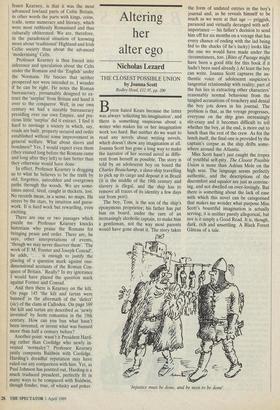Altering her alter ego
Nicholas Lezard
THE CLOSEST POSSIBLE UNION by Joanna Scott
Bodley Head, £12.95, pp. 290
Byron hated Keats because the latter was always 'soliciting his imagination', and there is something suspicious about a writer who makes his or her imagination work too hard. But neither do we want to read any novels about writing novels, which doesn't show any imagination at all. Joanna Scott has gone a long way to make the narrator of her second novel as diffe- rent from herself as possible. The story is told by an adolescent boy on board the Charles Beauchamp, a slave-ship travelling to pick up its cargo and deposit it in Brazil (it is the middle of the 19th century and slavery is illegal, and the ship has to remove all traces of its identity a few days out from port).
The boy, Tom, is the son of the ship's eponymous proprietor; his father has put him on board, under the care of an increasingly alcoholic captain, to make him a gentleman, not the way most parents would have gone about it. The story takes the form of undated entries in the boy's journal and, as he reveals himself to be much as we were at that age — priggish, paranoid and virtually deranged with self- importance — his father's decision to send him off for six months on a voyage that has every chance of ending with the lad being fed to the sharks (if he's lucky) looks like the one we would have made under the circumstances, too. (Rites of Passage might have been a good title for this book if it hadn't been used already.) At least the boy can write. Joanna Scott captures the au- thentic voice of adolescent suspicion's tangential relationship with reality; part of the fun lies in extracting other characters' reasonably normal behaviour from the tangled accusations of treachery and denial the boy jots down in his journal. The problem is that, as the voyage progresses, everyone on the ship goes increasingly stir-crazy and it becomes difficult to tell whether the boy, at the end, is more out to lunch than the rest of the crew. As for the lunch itself, the final one is provided by the captain's corpse as the ship drifts some- where around the Atlantic.
Miss Scott hasn't just caught the tropes of youthful self-pity. The Closest Possible Union is more than Adrian Mole on the high seas. The language seems perfectly authentic, and the descriptions of the discomfort and squalor are just as convinc- ing, and not dwelled on over-lovingly. But there is something about the lack of ease with which this novel can be categorised that makes me wonder what purpose Miss Scott's bountiful imagination is actually serving; it is neither purely allegorical, but nor is it simply a Good Read. It is, though, dark, rich and unsettling. A Black Forest Gateau of a tale.
'Injustice must be done, and be seen to be done'.


















































 Previous page
Previous page